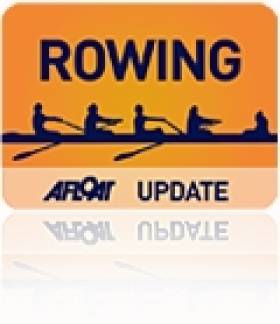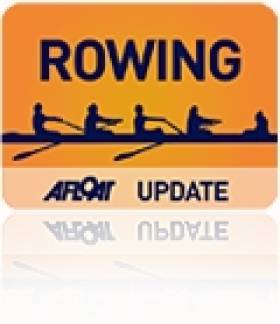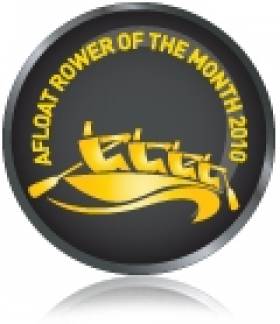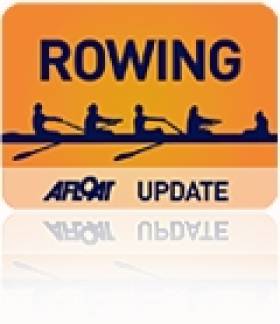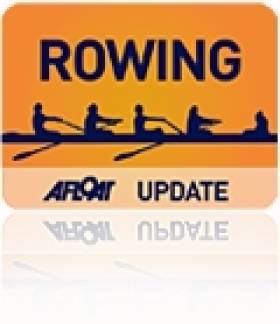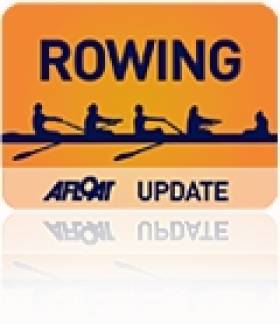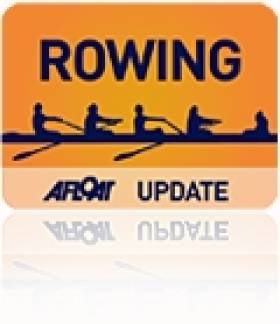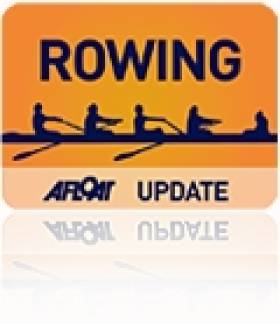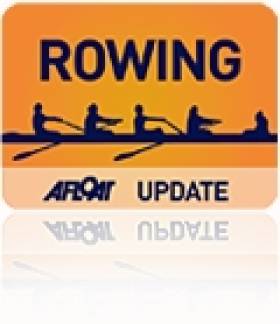Displaying items by tag: rowing
Two More Silver Medals for Ireland Juniors
Shane O’Driscoll and Paul O’Donovan added a second silver rowing medal to their collection on the final day of the Coupe de la Jeunesse in Hazewinkel in Belgium on Sunday. In a repeat of Saturday’s results, the Ireland junior double scull were again very close to gold-medal winners Hungary – this time just .3 of a second behind.
Ireland’s junior women’s quadruple also took silver. Denise Walsh, Holly Nixon, Christine Fitzgerald and Shelly Dineen finished a close-up second to Italy. The Ireland junior men’s pair of Rodrigo Prodohl and Simon Hewitt won their B Final and the junior men’s quadruple were fourth in their B Final (10th overall).
Coupe de la Jeunesse, Hazewinkel, Belgium. (Irish interest)
Saturday
Junior Men,
Pair – B Final (Places 7-12): 4 Ireland (S Hewitt, R Prodohl) 7:22.38.
Sculling, Quadruple – B Final (Places 7-12): 3 Ireland (M Monteith, D O’Driscoll, A Sheehan, G O’Donovan) 6:16.11.
Double - A Final: 1 Hungary 6:38.89, 2 Ireland (S O’Driscoll, P O’Donovan) 6:40.08, 3 Netherlands 6:42.43.
Junior Women
Sculling, Quadruple – A Final: 1 Italy 6:47.28, 4 Ireland (D Walsh, C Fitzgerald, S Dineen, H Nixon) 6:55.23.
Sunday
Junior Men,
Pair - B Final (Places 7-12): 1 Ireland 7:17.09.
Sculling, Quadruple – B Final (Places 7-12): 4 Ireland 6:20.75
Double – A Final: 1 Hungary 6:40.37, 2 Ireland (O’Driscoll, O’Donovan) 6:40.67, 3 Britain 6:41.09.
Junior Women,
Sculling, Quadruple – A Final: 1 Italy 6:48.25, 2 Ireland (Walsh, Fitzgerald, Dineen, Nixon) 6:49.43, 3 Britain 6:50.67.
Click this link for Irish Rowing detailsClick this link for the Latest Rowing News
Silver for Ireland in Coupe de la Jeunesse
Paul O’Donovan and Shane O’Driscoll took silver for Ireland in the Coupe de la Jeunesse at Hazewinkel in Belgium. The two Skibbereen men finished just 1.19 seconds behind Hungary in the double scull. Ireland’s women’s quadruple finished fourth in their A Final, while the men’s quadruple and pair finished ninth and 10th respectively.
Coupe de la Jeunesse, Hazewinkel, Belgium. Day One (Irish interest)
Junior Men,
Pair – B Final (Places 7-12): 4 Ireland (S Hewitt, R Prodohl) 7:22.38.
Sculling, Quadruple – B Final (Places 7-12): 3 Ireland (M Monteith, D O’Driscoll, A Sheehan, G O’Donovan) 6:16.11.
Double - A Final: 1 Hungary 6:38.89, 2 Ireland (S O’Driscoll, P O’Donovan) 6:40.08, 3 Netherlands 6:42.43.
Junior Women
Sculling, Quadruple – A Final: 1 Italy 6:47.28, 4 Ireland (D Walsh, C Fitzgerald, S Dineen, H Nixon) 6:55.23.
Click this link for Irish Rowing detailsClick this link for the Latest Rowing News
Silver Stars Shine Brightest in July
The Afloat Rowers of the Month for July are the men’s lightweight quadruple which took silver at the World Under-23 Championships in Brest, Belarus. Niall Kenny, Michael Maher, Mark O’Donovan and Justin Ryan were part of an Ireland team which performed exceptionally well at the Championships. It was also a bumper month in Irish domestic rowing, with some splendid racing at the National Championships. However, the quadruple were the stars of the show, taking a medal at a major international event. They are the Afloat Rowers of the Month.
Scroll down the page to listen to the Podcast for the inside track.
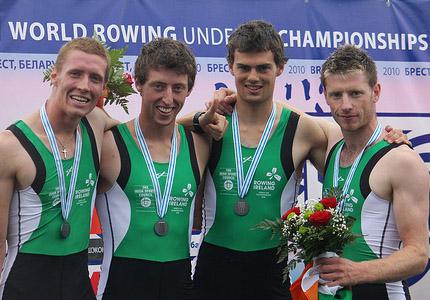
Silver in Belarus: Niall Kenny, Michael Maher, Mark O’Donovan and Justin Ryan
Rower of the Month awards: The judging panel is made up of Liam Gorman, rowing correspondent of The Irish Times, President of Rowing Ireland Anthony Dooley and David O'Brien, Editor of Afloat magazine. Monthly awards for achievements during the year will appear on afloat.ie and the overall national award will be presented to the person or crew who, in the judges' opinion, achieved the most notable results in, or made the most significant contribution to rowing during 2010. Keep a monthly eye on progress and watch our 2010 champions list grow.
Click this link for Irish Rowing detailsClick this link for the Latest Rowing News
Oarsome Foursome First to Row Round Britain
Four female rowers have become the first women ever to row around the coast of Britain. The women, who spent 51 days at sea, ended their epic 2,000-mile journey yesterday morning at Tower Bridge in London.
By becoming the first women ever to row around mainland Britain their time of 51 days 16hours 42minutes has been accepted for a Guinness World Record. Belinda Kirk, 35, from Bristol, Royal Navy nurse Laura Thomasson, 23, from Dover, IT support manager Beverley Ashton, 29, from Wantage, Oxfordshire and Angela Madsen, a wheelchair-bound 50-year-old grandmother and former US marine from Long Beach California are raising money for the services’ charity, Help For Heroes. When they set out from Tower Bridge in London on June 1, they were taking part in Virgin GB Row 2010 - the world’s toughest rowing race.
They were racing a team of four men around the British mainland. But when the male team gave up after less than two weeks, the women carried on alone and without any assistance for five more weeks. During that time the Seagals, as they are known were: swamped by huge waves which put the boat’s water maker out of action; almost sunk by a rogue wave that flooded the front cabin, survived storms, navigated some of the most treacherous tides on the planet, almost been mown down by ships, bombed by the RAF and they have run short of food.
Angela Madsen actually broke her finger setting off a flare to warn off a ship that was on a collision course. She then carried on rowing with a broken finger by strapping her hand to the oar. Because of bad weather and strong winds, their journey has taken three weeks more than expected and they packed enough food for just 40 days. And earlier this week a power failure onboard the boat meant they ration drinking water.
Sir Richard Branson who sponsored the event by awarding the first-ever Virgin Trophy to the winners, said: “Go Seagals!!! I knew I was right to back to girls in beating the boys in the first ever Virgin GB Row and I’m over the moon that such brave women have achieved a World Record in such a spectacular fashion! “This is why we set up the Virgin Trophy – Belinda, Angela, Laura and Beverley have pushed through extreme tiredness, hunger and serious injury to battle on and achieve the goal they set out to achieve. “Britain has something to be proud of this summer after all! I hope they will get all of Britain’s support when they record up the Thames on Thursday to claim their World Record and the Trophy!”
After passing under Tower Bridge at the end of their epic journey, the four women had an emotional reunion with friends and family they haven’t seen for more than seven weeks. They completely missed the world cup and Wimbledon passed them by.
Click this link for Irish Rowing details
Click this link for the Latest Rowing News
Silver Medal for Ireland at Under-23 World Champs
Ireland’s lightweight men’s quadruple scull took the silver medal behind Germany at the World Under-23 Championships in Brest in Belarus this morning. The crew of Niall Kenny, Michael Maher, Mark O’Donovan and Justin Ryan were the main challengers to the Germany, down the course, and an Ireland charge coming up to the finish threatened the eventual winners but could not close the gap. Britain, who finished well were over four seconds back on the Irish.

Silver in Belarus: Niall Kenny, Michael Maher, Mark O’Donovan and Justin Ryan
Under-23 World Championships, Brest, Belarus. Day Four (Irish interest)
Men,
Lightweight Pair – B Final (Places 7 to 12): 1 Austria 7:18.73, 2 Hong Kong 7:20.69, 3 Russia 7:23.12, 4 Ireland (P Hanily, A English) 7:28.46, 5 Brazil 7:34.12, 6 Canada 7:36.04.
Lightweight Quadruple Scull – A Final: 1 Germany 6:14.07, 2 Ireland (N Kenny, M Maher, M O’Donovan, J Ryan) 6:15.86, 3 Britain 6:20.06; 4 Italy 6:20.74, 5 France 6:23.26, 6 Greece 6:24.45.
Lightweight Single Scull – A Final: 1 Iran 7:17.93, 2 Britain (P Chambers) 7:19.59, 3 Brazil 7:23.38.
Women,
Single Scull – B Final (Places 7 to 12): 1 Serbia 8:15.26, 2 Netherlands 8:15.58, 3 Ireland (L Dilleen) 8:16.60, 4 Czech Republic 8:21.18, 5 Britain 8:22.56, 6 Spain 8:33.38.
Lightweight Double Scull – B Final (Places 7 to 12): 1 Spain 7:43.76, 2 Ireland (C Lambe, S Dolan) 7:44.24, 3 United States 7:44.57, 4 Denmark 7:46.44, 5 Netherlands 7:54.42, 6 Russia 7:54.72.
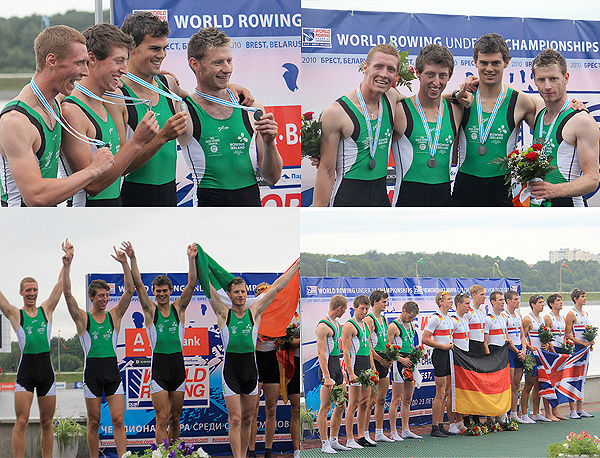
Ireland Women Win at Home Internationals
Ireland won the women’s senior and junior titles at the Home International Regatta at the National Rowing Centre in Cork. England won the men’s senior title and Wales were the surprise winners of the junior men’s title.
Home Internationals, National Rowing Centre, Cork
Men, Eight: 1 Ireland 5:55.8, 2 England 5:59.0, 3 Wales 6:05.9.
Pair: 1 Scotland 6:57.4, 2 Ireland 7:02.5, 3 Wales 7:07.2.
Lightweight Pair: 1 Ireland 7:07.3, 2 England 7:07.7, 3 Scotland 7:25.1
Sculling, Quadruple: 1 England 6:05.9, 2 Ireland 6:10.5, 3 Wales 6:11.2. Double: 1 England 6:44.7, 2 Wales 6:49.6, 3 Ireland 6:52.9.
Lightweight Double: 1 England 6:49.9, 2 Ireland 6:54.0, 3 Wales 6:54.9. Single: 1 England 7:17.0, 2 Wales 7:21.2, 3 Ireland 7:28.2. Lightweight Single: 1 England 7:23.6, 2 Scotland 7:26.5, 3 Wales 7:29.8, 4 Ireland 7:51.3
Under-23 Four: 1 Ireland 6:17.1, 2 England 6:23.8, 3 Wales 6:29.2.
Junior, Eight: 1 England 6:02.0, 2 Wales 6:09.2, 3 Ireland 6:14.3.
Four: 1 Wales 6:34.0, 2 Ireland 6:42.5, 3 England 6:45.4. Four, coxed: 1 Wales 6:36.0, 2 Ireland 6:44.4, 3 England 6:50.2.
Pair: 1 Ireland 7:08.8, 2 Wales 7:24.0, 3 England 7:24.0
Sculling, Quadruple: 1 England 6:16.8, 2 Wales 6:17.4, 3 Scotland 6:26.5. Double 1 Wales 6:55.6, 2 England 6:59.2, 3 Scotland 7:10.2. Single: 1 Wales 7:20.7, 2 England 7:25.7, 3 Scotland 7:41.2, 4 Ireland 8:16.9
Men, Overall - Senior: 1 England 30, 2 Ireland 26, 3 Wales 19, 4 Scotland 15. Junior: 1 Wales 25, 2 England 20, 3 Ireland 15, 4 Scotland 10
Women
Eight: 1 England 6:42.9, 2 Scotland 6:48.5, 3 Wales 6:48.7, 4 Ireland 6:58.6.
Pair: 1 Wales 7:41.7, 2 England 7:45.9, 3 Ireland 8:03.9
Lightweight Pair: 1 Ireland 7:50.9, 2 Scotland 7:51.5, 3 Wales 8:02.5
Sculling, Quadruple: 1 Ireland 6:55.3, 2 Wales 7:05.4, 3 England 7:07.1. Double: 1 Ireland 7:23.7, 2 Wales 7:28.9, 3 England 7:31.1.
Lightweight Double: 1 Ireland 7:28.7, 2 England 7:29.3, 3 Wales 7:53.9. Single: 1 England 8:06.3, 2 Wales 8:16.4, 3 Ireland 8:24.4. Lightweight Single: 1 Ireland 8:10.6, 2 Wales 8:17.2, 3 England 8:22.0
Under-23 Four: 1 Wales 7:09.0, 2 England 7:10.7, 3 Ireland 7:18.1.
Junior
Eight: 1 Ireland 6:44.4, 2 England 6:58.1, 3 Scotland 7:05.4.
Four: 1 Scotland 7:34.4, 2 England 7:44.5, 3 Ireland 7:46.9. Four, coxed: 1 Ireland 7:22.4, 2 England 7:22.8, 3 Wales 7:39.2.
Pair: 1 Ireland 7:57.1, 2 Scotland 8:11.4, 3 England 8:23.6
Sculling, Quadruple: 1 Ireland 6:57.9, 2 Wales 6:09.2, 3 England 7:17.0. Double: 1 Ireland 7:37.0, 2 Wales 7:39.4, 3 England 7:46.6.
Sculling, Double: 1 Ireland 7:37.0, 2 Wales 7:39.4, 3 England 7:46.6. Single: 1 Wales 8:16.9, 2 Ireland 8:28.1, 3 Scotland 8:29.0
Women, Overall – Senior: 1 Ireland 27, 2 Wales 26, 3 England 24, 4 Scotland 13. Junior: 1 Ireland 25, 2 England 16, 3 Wales 15, 4 Scotland 14.
Click this link for Irish Rowing detailsClick this link for the Latest Rowing News
Lightweight Quadruple Power Into A Final
Ireland’s lightweight quadruple scull qualified for the A Final of the Under-23 World Championships in Brest in Belarus early this morning. France set the early pace, but Ireland passed them before 1500 metres and won the race from Britain, with France holding off a late charge by Switzerland to take third and secure a place in tomorrow’s final.
The Ireland women’s lightweight double scull had a dramatic semi-final, but not in the way they would have liked. Claire Lambe and Sarah Dolan were, according to race commentary, given a yellow card and the race had to be delayed. When it finally was run, Ireland got stuck in fourth and Greece, New Zealand and Britain took the A Final places.
The Ireland lightweight pair also finished fourth in their semi-final. They held third at 1500 metres, behind France and Italy. In the final quarter Hungary ousted the Irish from a qualification spot, and finished so quickly they finished second behind France, with Italy third.
Lisa Dilleen is also set to compete in the B Final tomorrow. By half way the Galway woman, who had come through an energy-sapping repechage, was off the pace of a semi-final won by Norway’s Tale Gjoertz. Dilleen finished sixth.
Under-23 World Championships, Brest, Belarus. Day Three (Irish interest):
Men
Lightweight Pair (First Three to A Final; rest to B Final): 1 France 6:45.08, 2 Hungary 6:46.38, 3 Italy 6:47.47; 4 Ireland (P Hanily, A English) 6:49.48, 5 Brazil 7:00.44, 6 Canada 7:04.54.
Lightweight Quadruple (First Three to A Final; rest to B Final): 1 Ireland (N Kenny, M Maher, M O’Donovan, J Ryan) 6:02.23, 2 Britain 6:02.96, 3 France 6:03.46; 4 Switzerland 6:03.62, 5 Netherlands 6:06.88, 6 Poland 6:09.73.
Lightweight Single Scull (First Three to A Final; rest to B Final): 1 Britain (P Chambers) 7:00.72, 2 France 7:01.93, 3 Belarus 7:02.67.
Women
Single Scull (First Three to A Final; rest to B Final): 1 Norway 7:41.12, 2 United States 7:41.86, 3 Belarus 7:44.70; 4 Czech Republic 7:52.44, 5 Netherlands 7:53.78, 6 Ireland (L Dilleen) 8:07.63.
Lightweight Double Scull (First Three to A Final; rest to B Final): 1 Greece 7:05.68, 2 New Zealand 7:05.69, 3 Britain 7:16.50; 4 Ireland (C Lambe, S Dolan) 7:18.29, 5 United States 7:18.31, 6 Denmark 7:26.26. Click this link for Irish Rowing detailsClick this link for the Latest Rowing News
Dilleen Fights Her Way to Semi-Final
Lisa Dilleen produced a terrific performance to finish third in her repechage and qualify for the A/B semi-finals of the women’s single scull at the World Under-23 Championships at Brest in Belarus.
The Galway woman moved into third place just before halfway, but to hold it she had to fight off the challenge of Russia’s Mayya Reznikova, who had drawn level by 1750 metres.
The Czech Republic’s Denisa Cvancarova won, with Britain’s Rosamund Bradbury second. Dilleen was .15 of a second ahead of Reznikova in third.
Under-23 World Championships, Brest, Belarus. Day Two (Irish interest):
Women’s Single Scull, Repechage, Repechage One (First Three to A/B Semi-Final; rest to C Final): 1 Czech Republic 7:46.08, 2 Britain 7:48.18, 3 Ireland (L Dilleen) 7:49.47; 4 Russia 7:49.62, 5 Greece 8:02.35, 6 Latvia 8:06.38
Click this link for Irish Rowing detailsClick this link for the Latest Rowing News
Lambe and Dolan Complete Good Day for Irish
Claire Lambe and Sarah Dolan moved confidently into the semi-finals of the World Under-23 Championships in Belarus by placing second in their heat of the lightweight double sculls. Canada set a startling pace at the start and won from there, but Ireland carved out a notch in second and held it to the end. Spain held off Denmark for the third direct qualification spot for the A/B semi-finals.
World Under-23 Championships, Belarus. Day One (Irish interest):
Men
Lightweight Pair – Heat Four (First Two Directly to A/B Semi-Finals): 1 Ireland (P Hanily, A English) 6:54.86, 2 Hong Kong 6:59.95; 3 Moldova 7:11.77, 4 Belarus 7:16.45
Lightweight Quadruple Scull – Heat One (First Three Directly to A/B Semi-Finals): 1 Germany 6:00.49, 2 Ireland (N Kenny, M Maher, M O’Donovan, J Ryan) 6:01.75, 3 Greece 6:02.89; 4 France 6:04.16, 5 Slovakia 6:32.71
Women
Single Scull – Heat Three (First Two Directly to A/B Semi-Finals; rest to Repechages): 1 Norway (T Gjoertz) 7:50.13, 2 Estonia (K Pajusalu) 7:51.10; 3 Britain 7:59.26, 4 Serbia 8:00.09, 5 Ireland (L Dilleen) 8:05.71.
Lightweight Double Sculls – Heat Two (First Three Directly to A/B Semi-Finals): 1 Canada 7:23.54, 2 Ireland (C Lambe, S Dolan) 7:27.22, 3 Spain 7:32.85; 4 Denmark 7:33.31, 5 Romania 7:46.29.
Click this link for Irish Rowing detailsClick this link for the Latest Rowing News
Irish Shine in Under-23 Heats
Two Ireland crews qualified directly for the A/B Semi-Finals at the World Under-23 Championships in Brest, Belarus. The lightweight pair of Peter Hanily and Anthony English won their four-boat heat by over five seconds from Hong Kong. Both qualified.
The lightweight quadruple scull of Niall Kenny, Michael Maher, Mark O’Donovan and Justin Ryan were second to Germany in their heat, which had three qualifiers. Greece were third.
Lisa Dilleen, back in action after months of a lay-off, finished fifth in her heat of the women’s single scull. The race was won by Tale Gjoertz of Norway, who took over the lead from Kalsa Pajusalu of Norway, who led until 1700 metres. They both went through directly.
World Under-23 Championships, Belarus. Day One (Irish interest):
Men
Lightweight Pair – Heat Four (First Two to A/B Semi-Finals): 1 Ireland (P Hanily, A English) 6:54.86, 2 Hong Kong 6:59.95; 3 Moldova 7:11.77, 4 Belarus 7:16.45
Lightweight Quadruple Scull – Heat One (First Three to A/B Semi-Finals): 1 Germany 6:00.49, 2 Ireland (N Kenny, M Maher, M O’Donovan, J Ryan) 6:01.75, 3 Greece 6:02.89; 4 France 6:04.16, 5 Slovakia 6:32.71
Women
Single Scull – Heat Three (First Two Directly to A/B Semi-Finals; rest to Repechages): 1 Norway (T Gjoertz) 7:50.13, 2 Estonia (K Pajusalu) 7:51.10; 3 Britain 7:59.26, 4 Serbia 8:00.09, 5 Ireland (L Dilleen) 8:05.71.
Click this link for Irish Rowing detailsClick this link for the Latest Rowing News


























